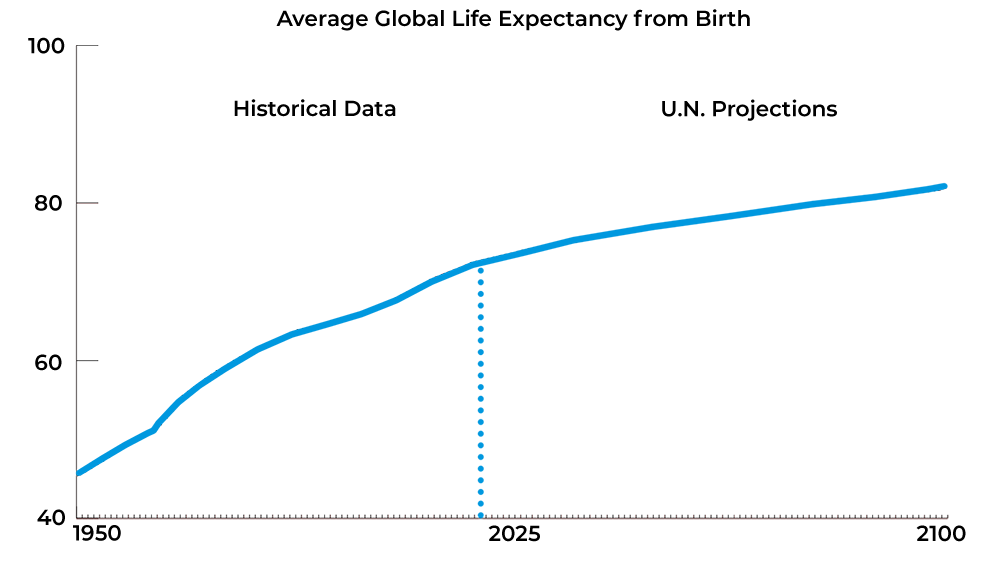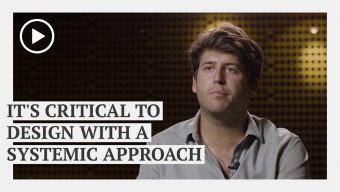“…you must not think a man has lived long because he has white hair and wrinkles: he has not lived long, just existed long.” This understanding of time and one’s life comes to us from Seneca some two thousand years ago. Yet, still to this day one of our major preoccupations is how to live a long life – and indeed we are, on average, on the earth longer. In 1950, the world’s overall life expectancy was 45.51. The current life expectancy is 72.81.
Thus, our longevity gives us the opportunity to participate in several decades of an active, vibrant, productive, fulfilling, and healthy life. Achieving this takes significant planning and foresight along with external help from the healthcare industry, technology, and genetic sciences – and those reading this article may reach the ripe old age of 100. In fact, there are some experts who think this number is actually too low. Researchers have recently estimated the human lifespan to stretch to 150 in the not too distant future.
There are a number of factors that have contributed to a longer averaged life expectancy over the last hundred years, but three elements in particular have proven to be key:
- Improvements in nutrition, healthcare services, and civil organization.
- The discovery and development of antibiotics and vaccines to combat the most common diseases (the most recent example being the Covid-19 vaccine.)
- The global reduction of infant and maternal mortality rates.
Together, these have added one to two years to people’s lives per decade. In other words, if you are in your 40s, your life expectancy now is about eight years more than it was when you were born. On top of all of this, advancements in science and technology are exponentially accelerating the possibility of adding not just two, but four (or even eight) additional years of life expectancy per decade.
Source: Macro Trends
There will be a time when science overcomes aging and we reach what biomedical gerontologist Aubrey de Grey coined as the longevity escape velocity (LEV), which will cause a revolutionary extension of the human lifespan. Our assumptions about aging will soon be turned upside down and the most optimistic advocates of LEV venture a time frame of 12 years for this to happen, while the most conservative of the group estimate somewhere between 50 and 80 years.
So, while we wait that out, we have the opportunity to try understand what we can do right now to live not only longer but better. In his book, The Science and Technology of Growing Young, Sergey Young – whose goal, by the way, is to live to 200 – tackles this question by dividing it into dimensions and horizons, as detailed in the following.
There are a number of dimensions to a long life expectancy:
- As obvious as it may be, it is important to acknowledge that a basic dimension of a long life is the prevention of premature death. This includes good nutrition and a healthy lifestyle, the treatment of disease, the taking of prescriptions and undergoing medical procedures, and general taking precautions towards our health. Within this prevention category is, also, products that de-risk operations and optimize our current longevity by increasing safety, such as autonomous vehicles and the da Vinci surgical system.
- Scientists agree that the upper age of life expectancy is currently well beyond 100 years, especially for women, with the “sound barrier” at about 115-125 years. Thus, the focus is on the extension of our lives to these upper limits and maximizing our life expectancy with the help of new technologies, caloric restriction, organ replacement, and more.
- Now, let us consider the possibility of not just the slowing down of the age clock, but the actual reversal of it. While it may seem like science fiction, this is the dimension that is particularly exciting to scientists, entrepreneurs, and investors. Already, experiments have been carried out on mice that were able to reprogram cells to a younger state.
On the horizon, there is plenty of opportunity and promise for life expectancy. In the near term of five to ten years’ time, technologies will arise that will change our concept of life expectancy, and also of healthcare. These include, but are certainly not limited to:
- Artificial intelligence used in basically everything from developing diagnostics to managing disease.
- Genetic engineering aimed at eradicating hereditary diseases and many cancers.
- Tissue and organ regeneration with the potential to provide a new liver, kidney, or even an eye.
- Diagnostic devices that can scan for signs of disease on a daily basis.
- Pharmaceutical interventions and an abundance of health data that will lead to a new paradigm of customized medicine based on biomarkers (which is particularly exciting because the technology to measure our biomarkers already exists today.)
There is no need to try strange drugs or make multiple titanic efforts in order to radically change our lives. Rather, it is a matter of embracing what is attainable now and using what is already known to work, such as taking care of our mental and physical health, a quality social life, a good diet, and plenty of sleep and exercise. It is also important to be open to the advancements that come next. This era in which we currently live – each of us with individual bodies and a collection of experiences that have gone around the sun a certain number of times – is marked by advances and improvements in technology. As a society, we have learned to use these technologies to our advantage and we must continue to do so.
The future, there is reason to hope, will encompass everything that allows us to live to 200… while feeling like we are only 25 years old. Now, let us be honest with each other: the idea is unsettling. Why? Because it goes beyond science and enters the realm of ethics, spirituality, and philosophy. It challenges the very foundation of our existence. We need to be ready for it, in both body and mind.
© IE Insights.









